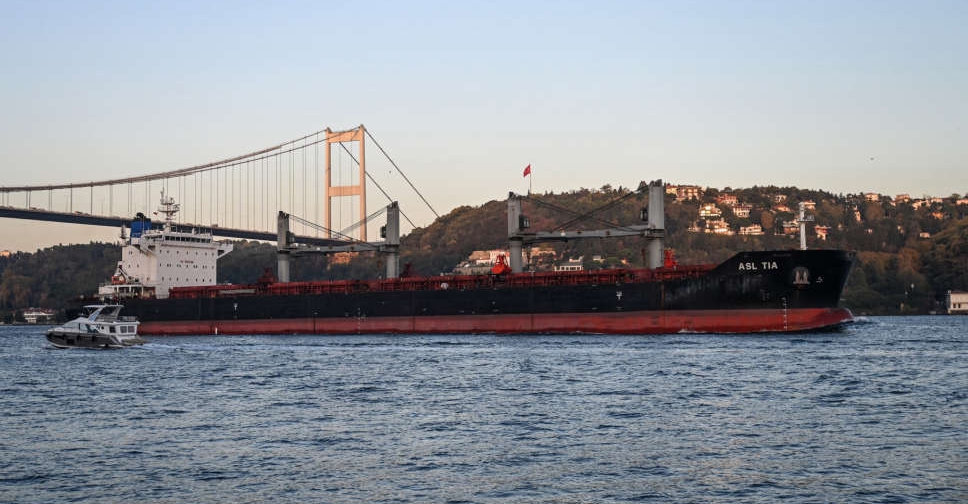
A pact that has allowed the safe Black Sea export of grain from Ukraine for the past year will expire at the end of Monday after Russia said it will suspend its participation.
The deal, brokered by the UN and Turkey last July, aimed to alleviate a global food crisis by allowing Ukrainian grain blocked by the Russia-Ukraine conflict to be exported safely.
The last ship left Ukraine under the deal on Sunday. Russia's February 2022 invasion and blockade of Ukraine's Black Sea ports sent global grain prices soaring. Ukraine and Russia are among the world's top grain exporters.
Nearly 33 million metric tons of corn, wheat and other grains have been exported by Ukraine under the arrangement.
Russia has formally notified Ukraine, via the Russian embassy in Minsk, that it was suspending its participation in the Black Sea grain deal.
Kremlin spokesperson Dmitry Peskov told reporters on Monday that the Black Sea agreements ceased to be valid today.
"Unfortunately, the part of these Black Sea agreements concerning Russia has not been implemented so far, so its effect is terminated," he said, adding that the decision not to renew the deal was unrelated to an overnight attack on the bridge between Russia and Crimea.
The Ukrainian military suggested the attack could be some kind of provocation by Russia itself but Ukrainian media cited unidentified sources as saying that Ukraine's Security Service was behind the incident.
Russia had threatened to quit the pact because it has said its demands to improve its own grain and fertilizer exports have not been met. Russia also has complained that not enough grain has reached poor countries. The UN has argued that the arrangement has benefited those states by helping lower food prices more than 20 per cent globally.
"As soon as the Russian part of the agreements is fulfilled, the Russian side will return to the implementation of this deal, immediately," Peskov added.
European Union Commission President Ursula von der Leyen called Russia's decision to suspend a Black Sea grain export deal a "cynical move", adding that the EU would continue to work towards ensuring food security for poor countries.
Turkish President Tayyip Erdogan said that he believed Russian President Vladimir Putin wants the continuation of the deal, adding that he will discuss it when they meet in person in August.
Denys Marchuk, deputy head of the Ukrainian Agrarian Council, the main agribusiness organisation in Ukraine, said alternative routes such as river ports were more expensive to use in terms of transportation costs.
However, he expected a solution.
"As an option, why don't we assess the possibility of the continuation of the grain deal without Russia? We had experience of this already in November 2022," he added.
The reaction on the grains market was modest, with US wheat futures up about 3 per cent and European futures up about 2 per cent, a German grains trader said.
"I think there is market belief that Russia and the EU have large supplies of wheat which can meet world demand in the coming months, with harvests arriving," he added.
However, Hasnain Malik, head of equity research at Tellimer Research said: "Suspension of the Black Sea deal is not unexpected and may bring to an end the recent softening of commodity grain prices. That's bad news for smaller and poorer importers in emerging markets such as Egypt."
A key Russian demand has been for the Russian Agricultural Bank (Rosselkhozbank) to be reconnected to the SWIFT international payments system. The bank was cut off from SWIFT by the European Union in June 2022 over Russia's invasion.
UN Secretary-General Antonio Guterres made a final effort on Tuesday to convince Russian President Vladimir Putin to extend the grain deal for several months in exchange for the EU connecting a subsidiary of Rosselkhozbank to SWIFT for grain and fertilizer transactions, sources said.

 UK inquiry finds 'chilling' cover-up of infected blood scandal
UK inquiry finds 'chilling' cover-up of infected blood scandal
 Iranian President Raisi killed in helicopter accident, state media says
Iranian President Raisi killed in helicopter accident, state media says
 ICC prosecutor seeks arrest warrants for Israeli, Hamas leaders
ICC prosecutor seeks arrest warrants for Israeli, Hamas leaders
 Assange given permission to appeal against US extradition
Assange given permission to appeal against US extradition
 Israel intends to broaden Rafah sweep, Defence Minister tells US
Israel intends to broaden Rafah sweep, Defence Minister tells US




